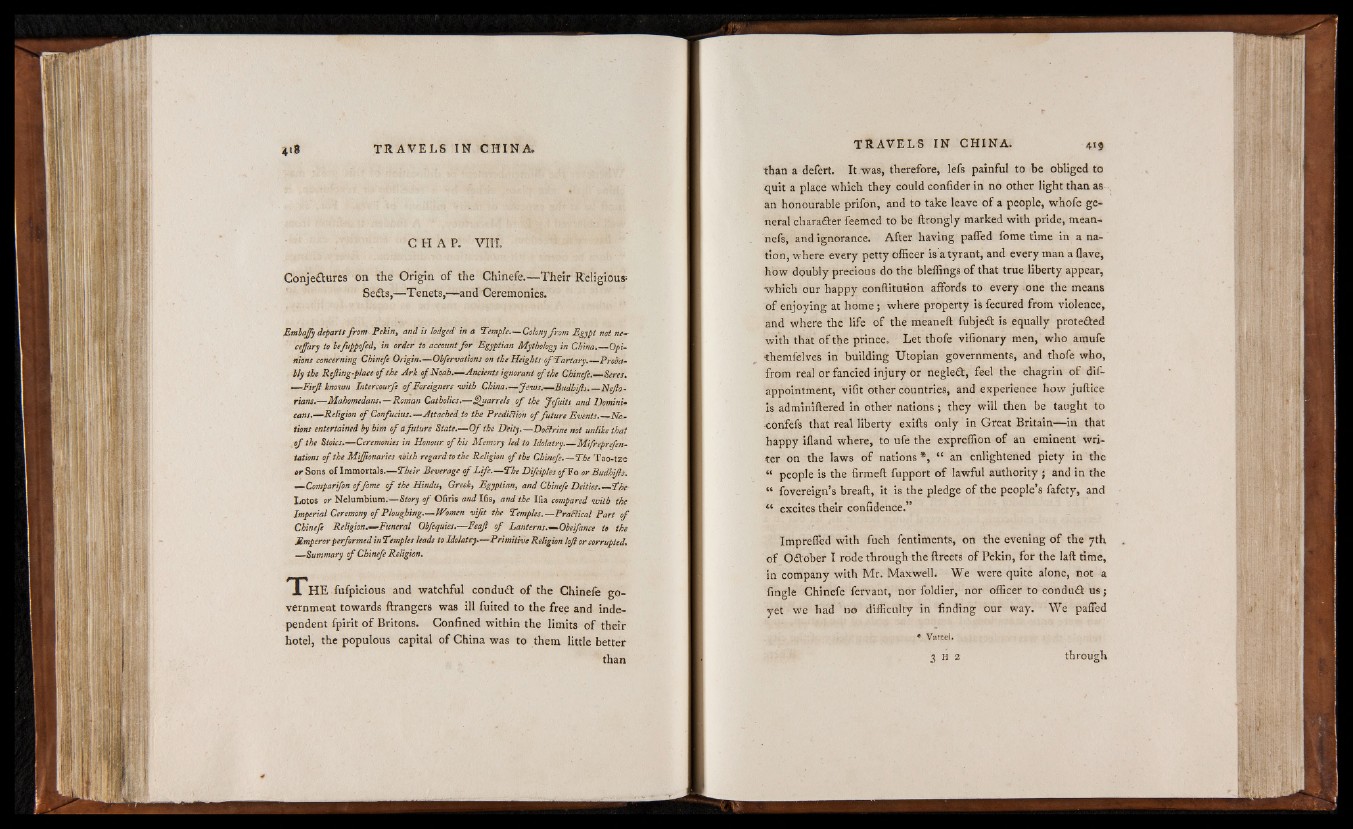
C H A P . VHT.
Conje&ures on the Origin o f the Chinefe.— Their Religious
Se&s,— Tenets,— and Ceremonies.
Embojfy departs from Pekin, and is lodged" in a Temple.— Colony from Egypt not n e -
cejfary to befuppofed, in order to account fo r Egyptian Mythology in China.—-Opinions
concerning Chinefe Origin.— Obfervations on the Heights ofTartary.— Probably
the Rejling-place o f the A r k o f Noah.— Ancients ignorant o f the Chinefe.— Seres.
— F i r f known Intercourfe o f Foreigners with China.— Jews.— Budhijls. Nejlorians.—
Mahomedans.— Roman Catholics.— Quarrels o f the Jefuits and Dominicans.—
Religion o f Confucius.— Attached to the Prediction o f fu tu r e Events.—
tions entertained by him o f a fu tu r e State.— O f the Deity.— DoClrine not unlike that
o f the Stoics.— Ceremonies in Honour o f his Memory led to Idolatry.— Mifreprefen-
tations o f the Miffonaries with regard to the Religion o f the Chinefe.— The T a o - tz e
or S ons o f Immortals.— Their Beverage o f L ife .— The Difciples o fF o or Budhijls.
— Comparifonoffome o f the Hindu, Greek, Egyptian, and Chinefe Deities.— The-
L o to s or Ne lumbium.— Story o f Ofiris and Ifis, and the Ifia compared with the
Imperial Ceremony o f Ploughing.— Women vifit the Temples.— Practical P a r t o f
Chinefe Religion.— Funeral Obfequies.— Feajl o f Lanterns.— Obeifance to the
Emperor performed inTemples leads to Idolatry.— Primitive Religion lojl or corrupted.
— Summary o f Chinefe Religion.
T P H E fufpicious and watchful conduit o f the Chinefe government
towards ftrangers was ill fuited to the free and independent
fpirit o f Britons. Confined within the limits o f their
hotel, the populous capital o f China was to them little better
than
than a defert. It .was, therefore, Iefs painful to be obliged to
quit a place which they could confider in no other light than as-
an honourable prifon, and to take leave o f a people, whofe general
chara&er feemed to be ftrongly marked with pride, mean-
nefs, and ignorance. After having paffed fome time in a nation,
where every petty officer is a tyrant, and every man a Have,
how doubly precious do the bleffings o f that true liberty appear,
which our happy conftiturion affords to every one the means
o f enjoying at home ; where property is fecured from violence,
and where the life o f the meaneft fubjeit is equally protected
with that o f the prince. Let thofe vifionary men, who amufe
-themfelves in building Utopian governments, and thofe who,
from real or fancied injury or negle£t, feel the chagrin o f disappointment,
vifit other countries, and experience how juftice
is adminiftered in other nations ; they will then be taught to
-con'fefs that real liberty exifts only in Great Britain— in that
happy ifland where, to ufe the expreffion o f an eminent writer
on the laws o f nations *, “ an enlightened piety in the
“ people is the firmed fupport o f lawful authority ; and in the
“ fovereign’s bread, it is the pledge o f the people’s fafety, and
“ excites their confidence.”
Imprefled with fuch fentiments, on the evening o f the 7th
o f October I rode through the dreets o f Pekin, for the lad time,
in company with Mr. Maxwell. We were quite alone, not a
fingle Chinefe fervant, nor foldier, nor officer to conduft us;
yet we had no difficulty in finding our way. We paffed
* Vattel.
3
H 2 through